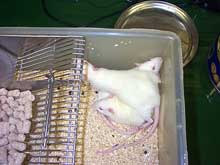Fluoxetine: antidepressant and a possible new drug for the treatment of obesity

Genetically fattened Zucker fa/fa rats <br>© University of the Basque Country
The Department of Nutrition and Bromatology of the Faculty of Pharmacy of Gasteiz, University of the Basque Country, is studying the action mechanism of fluoxetine in genetically fattened rats (Zucker fa/fa). Due to fluoxetine, those rats eat 50 % less. Therefore, the bodies put on less weight and the size of different fat tissues is reduced.
Antidepressants of the type of fluoxetine reduce appetite. More exactly, fluoxetine affects on neuropeptides that regulate appetite. Hence, it is believed that fluoxetine can be used to treat obesity.
After studying the action-mechanism of fluoxetine it has been observed that it reduces the quantity of Y neuropeptide. That peptide is orexigen, it causes appetite. The fluoxetine does hinders the trasport of that peptide, and so appetite is reduced.
That result has lead the scientists of the faculty of pharmacy to study the effect of fluoxetine on melanocortins. Melanocortins are important neuropeptides that control how many food is consumed. Now they are studying the changes that may occur in the operative system of melanocortins, both in MC4-R melanocortin receptors and in a-MSH (alfa melanocyte stimulating hormones) .
Hunger and neuropeptides
Appetite is a feeling that is created in the hypothalamus and its regulation is a complex process that depends on the regulation of neuropeptides, neurotransmitters and several hormones. In that process two types of neuropeptides must be taken into account: orexigens or appetite stimulants and anorexigens or reducers of appetite.
Some of the well-known orexigens are Y neuropeptide, some opioid peptides, endogenous cannabinoid, etc. Among anorexigens CRF (corticotropin releasing factor), CART (cocaine and amphetamine related transcript), melanocortin, galanin and cytokines. All those neuropeptides have effect on the hypothalamus and their interaction causes hunger and satiety.
It is believed that those neuropeptides could be the responsible of disorders such as obesity, anorexia nervosa and bulimia. Nowadays there is no appropriate drug to treat those disorders and some of the cures that have been used are very dangerous and harmful for the health, for example amphetamines. According to the result of this research, who knows if fluoxetine, apart from being an antidepressant, may become a secure drug to treat obesity.
Media Contact
All latest news from the category: Health and Medicine
This subject area encompasses research and studies in the field of human medicine.
Among the wide-ranging list of topics covered here are anesthesiology, anatomy, surgery, human genetics, hygiene and environmental medicine, internal medicine, neurology, pharmacology, physiology, urology and dental medicine.
Newest articles

A universal framework for spatial biology
SpatialData is a freely accessible tool to unify and integrate data from different omics technologies accounting for spatial information, which can provide holistic insights into health and disease. Biological processes…

How complex biological processes arise
A $20 million grant from the U.S. National Science Foundation (NSF) will support the establishment and operation of the National Synthesis Center for Emergence in the Molecular and Cellular Sciences (NCEMS) at…

Airborne single-photon lidar system achieves high-resolution 3D imaging
Compact, low-power system opens doors for photon-efficient drone and satellite-based environmental monitoring and mapping. Researchers have developed a compact and lightweight single-photon airborne lidar system that can acquire high-resolution 3D…





















